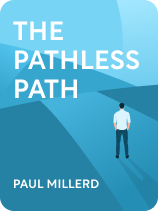

This article is an excerpt from the Shortform book guide to "The Pathless Path" by Paul Millerd. Shortform has the world's best summaries and analyses of books you should be reading.
Like this article? Sign up for a free trial here.
How comfortable are you with financial insecurity? Where could you cut expenses? How can you get supporters to give you more money?
In the traditional workforce, you have a steady stream of income, and—according to society, at least—you should be consistently building wealth for the rest of your life. In contrast, self-employment rarely comes with a stable income, and you’re not likely to become very wealthy.
Read more to discover four money habits that freelancing guru Paul Millerd recommends.
Habit #1: Pursue Sustainability
Instead of pursuing exponentially growing wealth, pursue sustainability. This money habit is aimed at making just enough money to meet your needs. When you’re always trying to make more money, you lose some of your freedom: You can’t say no to any opportunity to make money, no matter how miserable it makes you, and you can’t say yes to opportunities that are more emotionally rewarding than financially rewarding. On the other hand, when you deprioritize work, you’re saying that enjoying life is more important to you than having a lot of money—so aim to bring in an income that enables you to enjoy life.
(Shortform note: In Minimalism, Joshua Fields Millburn and Ryan Nicodemus argue similarly that sustainability is a much better goal than a life of excess. If you tend toward excess and want to change that, they recommend starting by identifying your anchors (possessions or financial responsibilities that make you feel stuck). Then, classify those as major anchors (large responsibilities like car payments) and minor anchors (small responsibilities like clutter). Finally, get rid of as many anchors as you can, starting with the major ones. They say this will reduce your stress, free up your time, and help you find overall happiness.)
Habit #2: Adopt Frugality
You’re trading higher pay for a higher quality of life, so you need to make every cent count. Millerd recommends spending money only on the things you need to be happy and cutting extra costs wherever possible—that way, you can spend less time working and more time enjoying life (by spending time with your family, for instance).
(Shortform note: To live more frugally, experts recommend keeping track of your expenses for a month or two, and then evaluating them: What’s necessary, and what’s not? Then, cut back on any extra purchases that don’t add value to your life. According to some research, valuable purchases include those that save you time (which you can reinvest in enjoyable activities) and those that enable you to have meaningful experiences, as opposed to just accumulating material goods.)
Habit #3: Accept Insecurity
Millerd argues that no amount of money can guarantee total, everlasting security. Even if you had a million dollars in the bank, something could happen tomorrow to wipe out your funds. He says that worrying about the future is an unavoidable part of life (not just freelancer finances), and it’s healthier to accept and deal with those worries as they come up than to avoid worrying entirely.
(Shortform note: In The Wisdom of Insecurity, philosopher Alan Watts argues similarly that insecurity is a fundamental part of human life. He explains that this is because life is inherently ephemeral—everything is in a constant state of flux. He says that trying to achieve security can only lead to further misery because the desire for security is based on an illusion that you can achieve a state of permanence. As an alternative to worrying about the future, he suggests embracing insecurity and going with the flow from moment to moment.)
Habit #4: Embrace Generosity
Millerd explains that flexible payment models are becoming more popular—for example, many freelancers offer subscriptions to their services via platforms like Patreon and pay-what-you-want options for people who may not be able to afford their services. He explains that people usually appreciate these payment models because they’re voluntary and fair—so they’ll be generous with the amount of money they give you. You should also be generous with others, as Millerd says that will increase the likelihood of others being generous with you.
(Shortform note: Experts note a potential drawback to flexible payment plans—you might not bring in a large enough income. According to public data, a very small percentage of Patreon creators bring in more than the US federal minimum wage ($7.25 per hour). Some businesses that offer a pay-what-you-want option have suffered major earnings losses. Research suggests that to make a profit with flexible payment plans, you need to build up a large base of loyal customers—the more stable their relationship with you, the more likely they’ll be to pay you fairly, and having a large number of customers can make up for the times when some customers don’t.)

———End of Preview———
Like what you just read? Read the rest of the world's best book summary and analysis of Paul Millerd's "The Pathless Path" at Shortform.
Here's what you'll find in our full The Pathless Path summary:
- How to take a non-traditional approach to career success through freelancing
- Why Americans prioritize work and the disadvantages of this lifestyle
- One man's inspiring story of shifting from the workforce to freelancing






